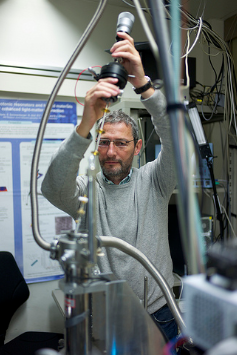Components for future computer systems processing Big Data: IBM Scientists Demonstrate Quantum Phenomenon.
 |
| IBM Credit |
At Connectikpeople we were
very excited yesterday by discovering the work of the IBM Scientists.
We can thus observe
that, the IBM Scientists has demonstrated a complex
quantum mechanical phenomenon known as Bose-Einstein condensation (BEC), using
a luminescent polymer (plastic) similar to the materials in light emitting
displays used in many of today's smartphones. The final result could be energy-efficient lasers and optical
switches, critical components for future computer systems processing Big Data
.
The complex phenomenon, IBM scientists has demonstrated at room temperature
is named after the renowned scientists Satyendranath Bose and Albert Einstein
who first predicted it in the mid-1920s and only later experimentally proven in
1995.
A Bose-Einstein Condensate is a peculiar state of matter which occurs when
a dilute gas of particles (bosons) are cooled to nearly absolute zero (-273
Celsius, -459 Fahrenheit). At this temperature intriguing macroscopic quantum
phenomena occur in which the bosons all line up like ballroom dancers.
In the experiment, a thin polymeric layer is placed between two mirrors and
excited with laser light. This thin plastic film is approximately 35 nanometers
thick, for comparison a sheet of paper is about 100,000 nanometers thick. The
bosonic particles are created through interaction of the polymer material and
light which bounces back and forth between the two mirrors.
The phenomenon only lasts for a few picoseconds (one trillionth of a
second), but the scientists believe this is already long enough to use the
bosons to create a source of laser-like light and/or an optical switch for
future optical interconnects. These components are important building blocks to
control the flow of information in the form of zeroes and ones between future
chips and can significantly speed up their performance while using much less
energy.
The next step for scientists is to study and control the extraordinary
properties of the Bose-Einstein Condensate and to evaluate possible
applications including analog quantum simulations. Such simulations could be
used to model very complex scientific phenomena such as superconductivity,
which is difficult using today's computational approaches.
Connectikpeople recalls that, the research was funded under the European
Union's FP7 Project named ICARUS. The goal of ICARUS is to create and
characterize new hybrid-semiconductor systems and then implement them in
photonic and optoelectronic devices. www.icarus.group.shef.ac.uk.

